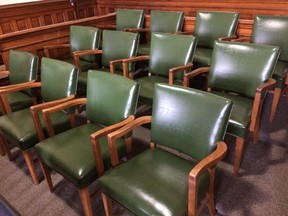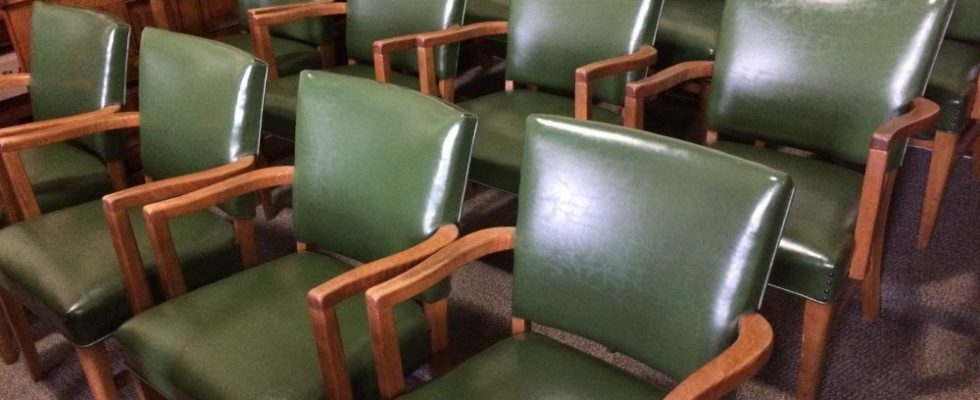
The following is the complete list of recommendations from the jury at the inquest into the death of Samuel Brown:
Advertisement 2
To the Ministry of Education, Provincial and Demonstration Schools Branch
That the Provincial and Demonstration Schools Branch (PDSB) of the Ministry of Education (MOE) review the availability of overnight medical resources provided to provincial and demonstration schools with overnight lodgings to ensure that schools are able to provide timely access to medical practitioners for students.
For the purpose of enhancing the safety of students who reside in on-campus lodging overnight at provincial schools, that the Ministry of Education draft and implement policies and procedures to enhance/ensure the 24 hour on-call availability of medical staff for students staying in lodging.
That the PDSB provide mandatory training on ableism, with particular emphasis on the dangers that medical ableism in general and diagnostic overshadowing in particular pose for people with disabilities to all staff who work in schools or classrooms with students with IDD. Such training should be developed in collaboration with ableism experts and include instruments for identifying and assessing personal and/or internalized ableism. Each staff member will be required to take this training at least once a year.
Advertisement 3
That the PDSB provide mandatory medical training on how to identify potential early symptoms of aspiration pneumonia and other potentially serious illnesses known to be common among people with intellectual and developmental disabilities (IDD) to all medical, classroom, and residential student support staff who work in schools with students with IDD. Each staff member will be required to take this training at least once a year.
That the PDSB mandate that all schools develop and support protocols for ongoing monitoring, documenting, and interdisciplinary consultation among staff regarding noticed changes in students’ behavior and/or medical symptoms. Such protocols should include a particular emphasis on identifying and flagging early signs and symptoms of potentially serious illness.
Advertisement 4
All phone locations be equipped with signage identifying the address, including building number and phone extension, to direct emergency personal to the proper location.
Ensure wheelchair accessibility at all entrances and ensure they are maintained to always allow for safe access for emergency personnel.
Send annual invitations to paramedics and fire departments to attend and tour of the school to allow familiarity of the layout.
Ensure the nurse supervisor is also a nurse for the purpose of medical oversight.
Develop and implement a system to verify that overnight bed checks are being completed, example cameras or bar code scanning in rooms.
To the W. Ross Macdonald School (WRMS)
Review and enhance Student Health Services (SHS) policies to require medical staff to give written instructions to classroom or residence staff, clearly detailing the medical surveillance required and with clear times and direction on when to return for further instruction, and how to access further medical advice.
Advertisement 5
Mandate that where SHS staff (or Team Lead in the absence of SHS staff) take a student’s vital signs, in addition to pulse, blood pressure and respiratory rate, the oxygen saturation be measured with a portable oximeter and that all vital signs be properly documented on the medical notes.
Mandate that any particular risks of injury and/or illness that a student may have (falls, chocking, aspiration, recurrent infections) be noted on the student’s records, including Plan of Care. The existence and location of a Plan of Care for a specific student will be communicated in the student’s bedroom. Any action plan initiated or changed must be signed off on by all staff.
Require parents or guardians to provide a yearly swallowing assessment by a speech language pathologist of any student with dysphagia and/or risk of aspiration, with the results of the assessment readily available on the student health record.
Advertisement 6
WRMS to review its current practice with respect to signage regarding any special requirements to be observed for students at risk for aspiration and PDSB to review its policy.
WRMS will facilitate a Speech Language Pathologist (SLP), as provided by the parents or guardians, to observe, at a schedule established by the SLP, any student with a risk of aspiration who needs assistance of staff with eating, so they can provide advice to staff.
Provide annual training or orientation to all staff about how to access medical resources provided via the school on a 24-hour basis.
Draft and implement staffing policy and procedures that pair staff teams with specific groups of students in order to optimize effective communication, particularly where students are non-verbal. The staffing shall be organized to ensure that at least one of a student’s regular staff is scheduled to cover all shifts.
Advertisement 7
To the Office of the Chief Coroner
That the formulation of cause of death statements involving persons with Intellectual and/or Developmental Disabilities (IDD) be reviewed to avoid ableist conclusions and to ensure illness or injury, where appropriate, is listed as the primary cause of death.
To the College of Physicians and Surgeons of Ontario
Working in collaboration with ableism experts, develop and offer training to doctors on ableism and medical ableism, with particular emphasis on the dangers that medical ableism, in general, and diagnostic overshadowing in particular, pose for people with disabilities. Such training should include instruments for identifying and assessing personal and/or internalized ableism.
To the College of Nurses of Ontario
Working in collaboration with ableism experts, develop and offer training to nurses on ableism and medical ableism, with particular emphasis on the dangers that medical ableism, in general, and diagnostic overshadowing in particular, pose for people with disabilities. Such training should include instruments for identifying and assessing personal and/or internalized ableism.

Comments
Postmedia is committed to maintaining a lively but civil forum for discussion and encourages all readers to share their views on our articles. Comments may take up to an hour for moderation before appearing on the site. We ask you to keep your comments relevant and respectful. We have enabled email notifications—you will now receive an email if you receive a reply to your comment, there is an update to a comment thread you follow or if a user you follow comments. Visit our Community Guidelines for more information and details on how to adjust your email settings.
Join the Conversation